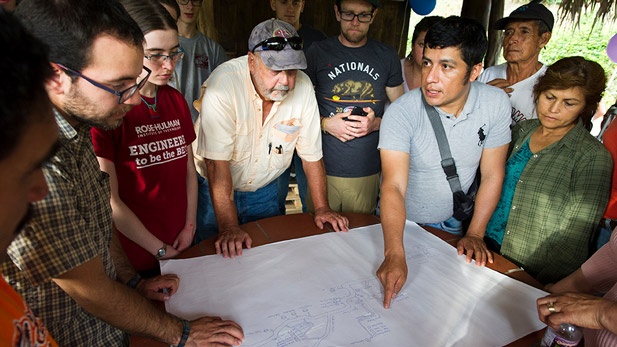Engineers Without Borders’ Students Span the Globe to Impact Others

For their newest global project, Engineers Without Borders student members interviewed citizens of Chaguarloma, Ecuador, to learn more about the obstacles they face in obtaining clean water, before embracing the challenge of devising a solution for them.
The Engineers Without Borders student organization is continuing its humanitarian engineering efforts, this time striving to bring clean water to a community in Ecuador that can’t be found on most maps. And, there are several opportunities for current and future students to provide helping hands with the global public service project.
Chaguarloma is a village in a region near the equator that has undulating terrain with homes that are so spread out that women have to walks hours round trip to find clean water to wash clothes. Many of the approximately 175 residents suffer health issues from drinking, cooking and cleaning with unsanitary water.
Five EWB members, faculty adviser John Gardner, professor of Spanish, and professional engineer liaisons Jed Holt, a 1970 civil engineering alumnus, and Liam Sawyer have completed assessing local needs, surveying the landscape and examining available resources. They are now formulating a plan that could bring clean water to the village during the next three to five years.
The project’s technical assessment team tested freshwater sources and completed a land survey of the community to examine which water sources would be viable for the transportation of water to homes, which are as much as 1,000 feet apart in elevation.
“People in Chaguarloma deserve to have the basics of life—clean water and a place to sleep,” says sophomore civil engineering student Peter Householter, who was a member of the assessment team.
Students also interviewed each family in the village that’s interested in participating in the water project about their water usage and how often they get sick from the current water supply. A summary report from this interview data was presented to help educate the community about the importance of boiling water before usage. This health issue must be resolved before EWB can bring clean water to each household.
“The community is so spread out that we may have to come up with a plan that uses different systems. Getting everything to work is going to be a real challenge,” says EWB leader Emily Haussmann, a senior mechanical engineering student and another member of the assessment team.
Haussmann points out that EWB members learn much from the social aspects of the project, including listening to others’ needs, while developing technical solutions for the project.
“[EWB] projects are interdisciplinary. Because we are working with people from different cultures and with different material circumstances, it's important to not make assumptions about what people want or what options are available,” she says.
Past chapter projects have helped bring a medical center, public latrines and a chicken brooder house to villagers in Ghana and the Dominican Republic.